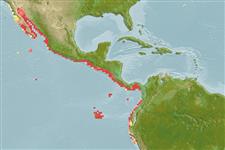Environment: milieu / climate zone / depth range / distribution range
Ecologia
marinhas demersal; intervalo de profundidade 50 - 130 m (Ref. 9342). Tropical; 33°N - 9°S, 118°W - 76°W (Ref. 5222)
Eastern Pacific: southern California to Peru. Misidentified as Epinephelus niveatus by some authors (Ref. 5995, 6852).
Tamanho / Peso / Idade
Maturity: Lm ? range ? - ? cm
Max length : 48.0 cm SL macho/indeterminado; (Ref. 5222)
Espinhos dorsais (total) : 11; Raios dorsais moles (total) : 13 - 15; Espinhos anais: 3; Raios anais moles: 9. Distinguished by the following characteristics: juveniles dark reddish brown with white spots in grid-like pattern of vertical series and horizontal rows on body and dorsal fin; caudal peduncle with visible dark saddle blotch; pale caudal and pectoral fins; dark brown anal and pelvic fins; black maxillary groove; adults dark brown lacking white spots; depth of body contained 2.3-2.7 times in SL; head length 2.2-2.5 times in SL; convex interorbital area; slightly produced angle of preopercle, with enlarged serrae; distinctly convex upper edge of operculum; vertically elongate posterior nostrils, 2-5 times larger than anterior nostrils; maxilla reaches to or beyond vertical at rear edge of eye; 2 rows of teeth on midlateral part of lower jaw (Ref. 89707).
Found on rocky reefs and soft bottoms (Ref. 89707). Reported to be often caught in shrimp trawls in central Gulf of California. Too rare to be of commercial interest.
Life cycle and mating behavior
Maturidade | Reprodução | Desova | Ovos | Fecundidade | Larvas
Craig, M.T. and P.A. Hastings, 2007. A molecular phylogeny of the groupers of the subfamily Epinephelinae (Serranidae) with revised classification of the epinephelini. Ichthyol. Res. 54:1-17. (Ref. 83414)
Categoria na Lista Vermelha da IUCN (Ref. 130435: Version 2024-1)
Ameaça para o homem
Harmless
Utilização humana
Pescarias: pescarias de subsistência; peixe desportivo: sim
Ferramentas
Relatórios especiais
Descarregue XML
Fontes da internet
Estimates based on models
Preferred temperature (Ref.
123201): 15.6 - 23.1, mean 17.2 °C (based on 19 cells).
Phylogenetic diversity index (Ref.
82804): PD
50 = 0.5001 [Uniqueness, from 0.5 = low to 2.0 = high].
Bayesian length-weight: a=0.01349 (0.00621 - 0.02932), b=3.03 (2.86 - 3.20), in cm total length, based on LWR estimates for this Genus-body shape (Ref.
93245).
Nível Trófico (Ref.
69278): 3.8 ±0.7 se; based on size and trophs of closest relatives
Resiliência (Ref.
120179): Médio, tempo mínimo de duplicação da população 1,4 - 4,4 anos (Preliminary K or Fecundity.).
Fishing Vulnerability (Ref.
59153): Moderate vulnerability (43 of 100).
Nutrients (Ref.
124155): Calcium = 99.3 [39.1, 183.2] mg/100g; Iron = 0.847 [0.447, 1.672] mg/100g; Protein = 18 [16, 20] %; Omega3 = 0.274 [0.161, 0.485] g/100g; Selenium = 56.8 [28.6, 119.5] μg/100g; VitaminA = 29.4 [9.3, 106.2] μg/100g; Zinc = 0.892 [0.613, 1.347] mg/100g (wet weight);
